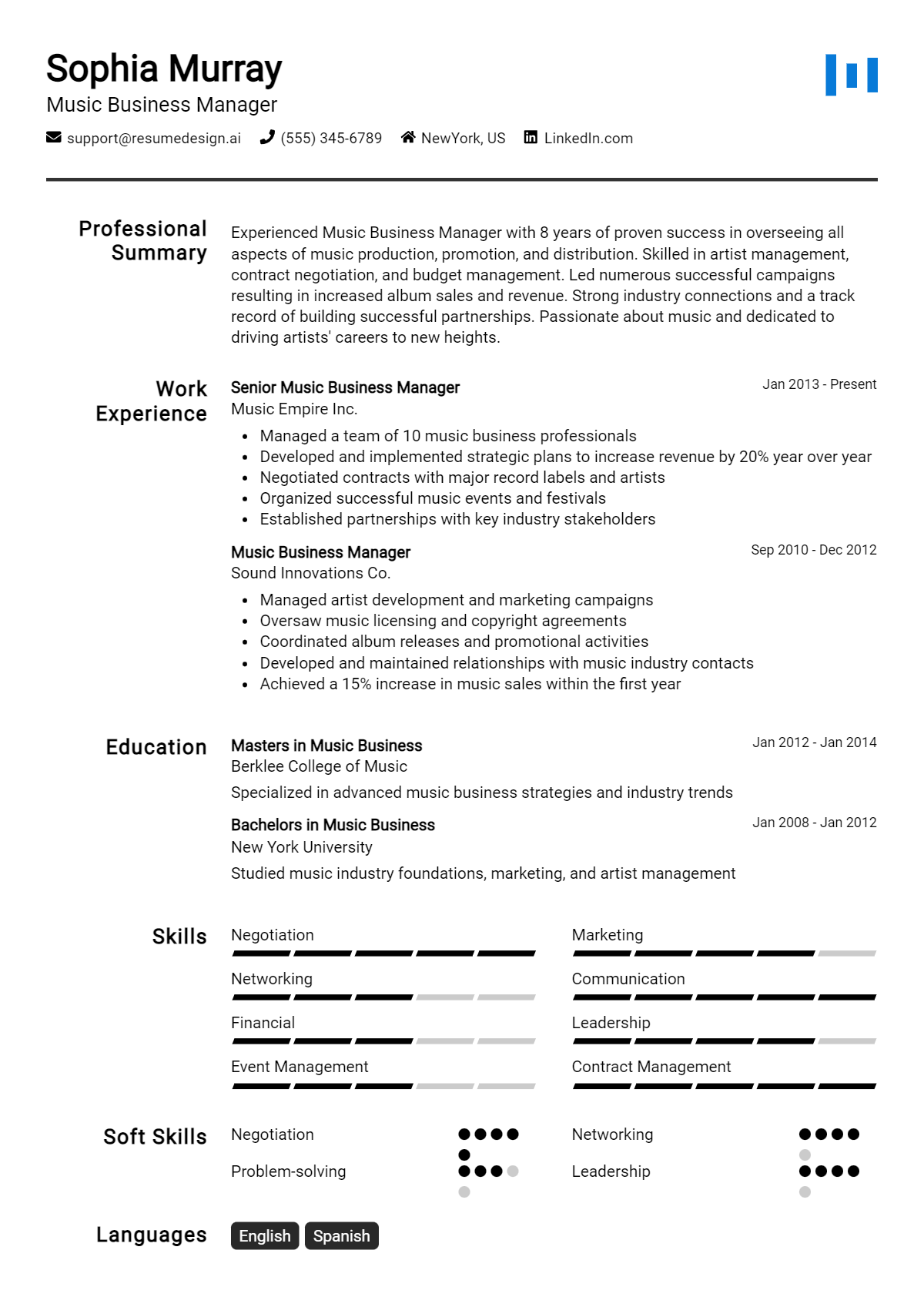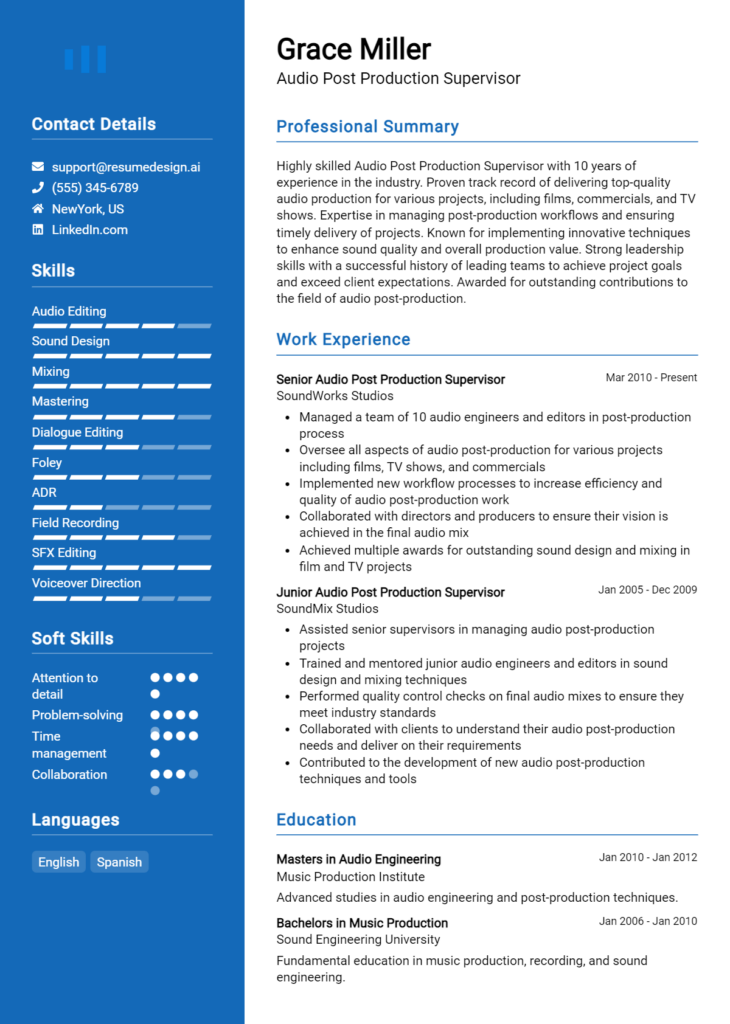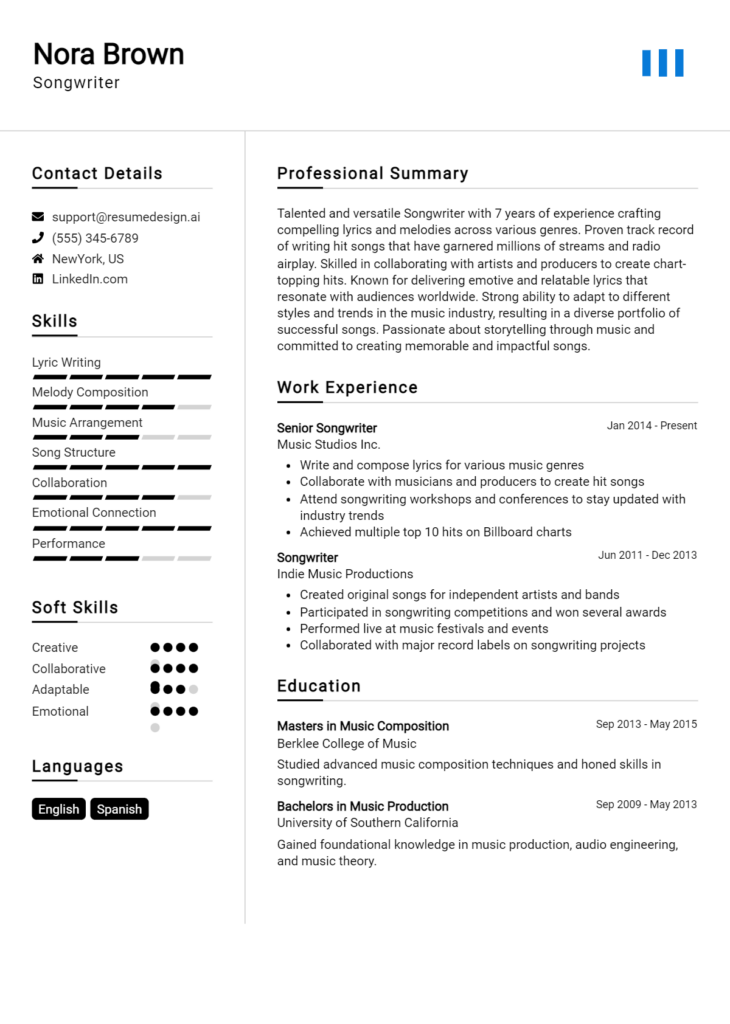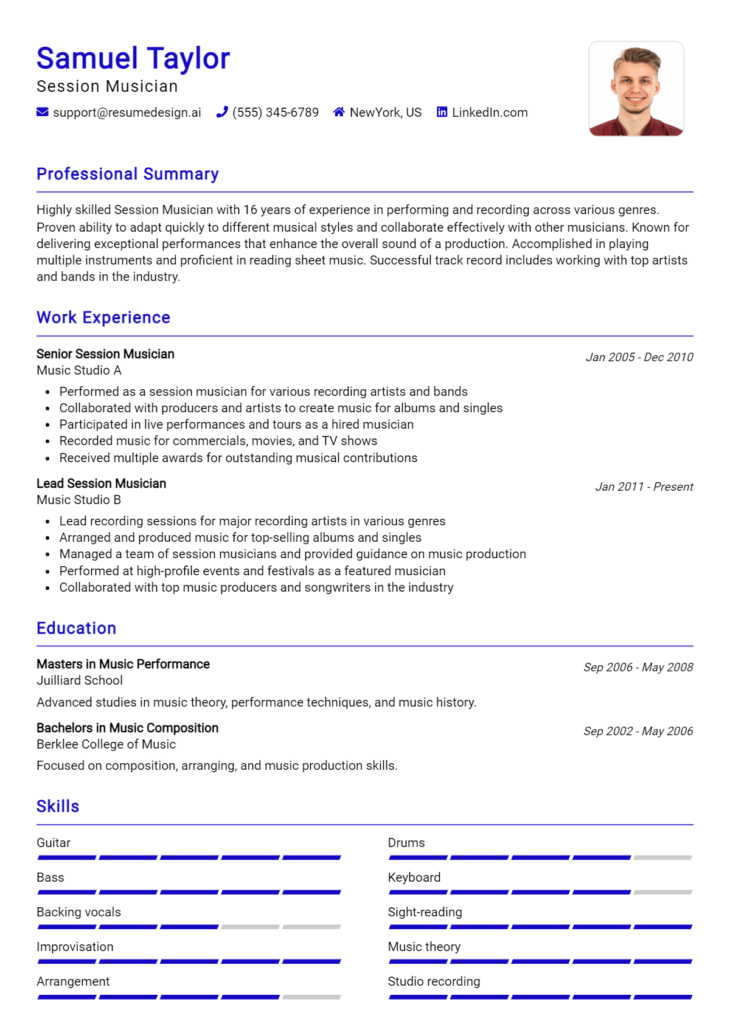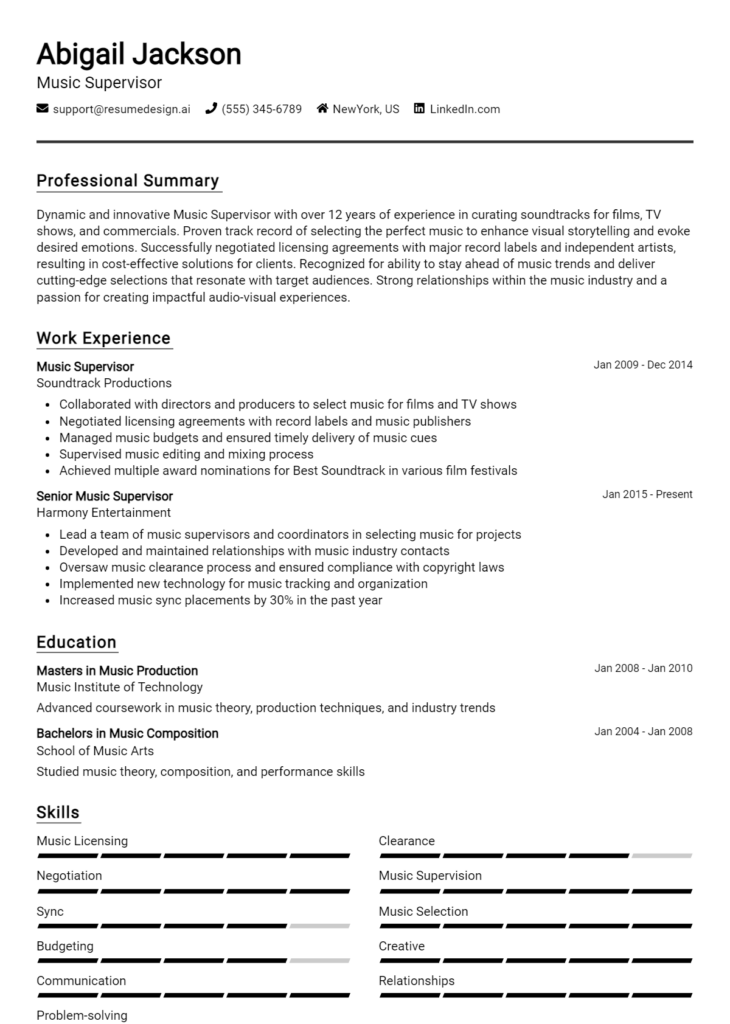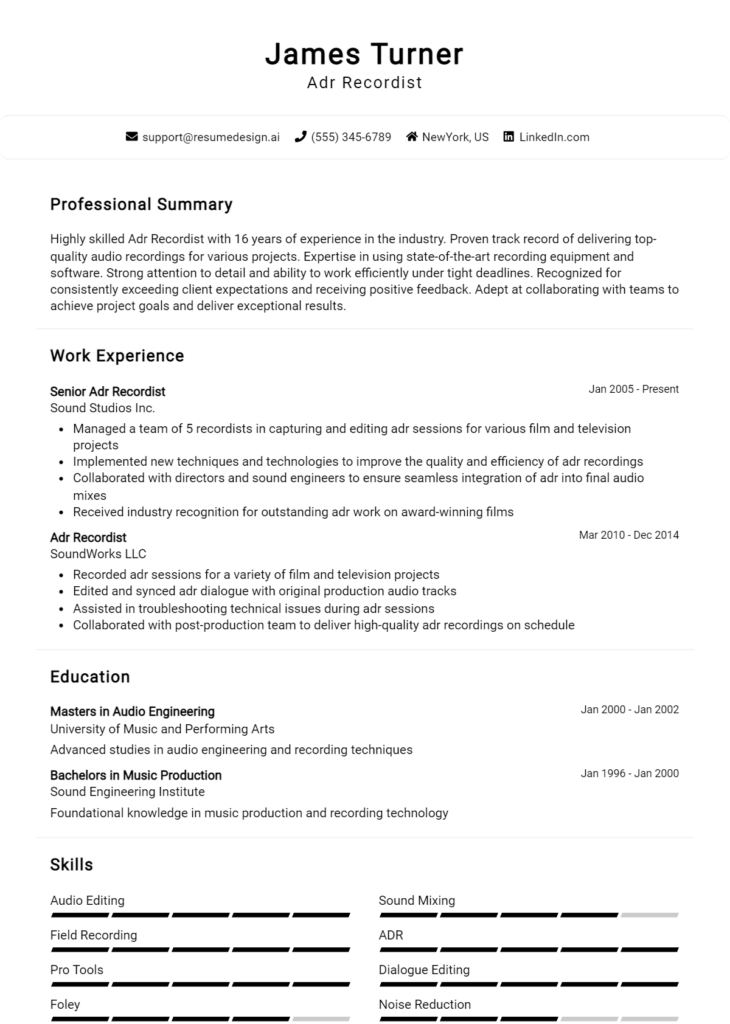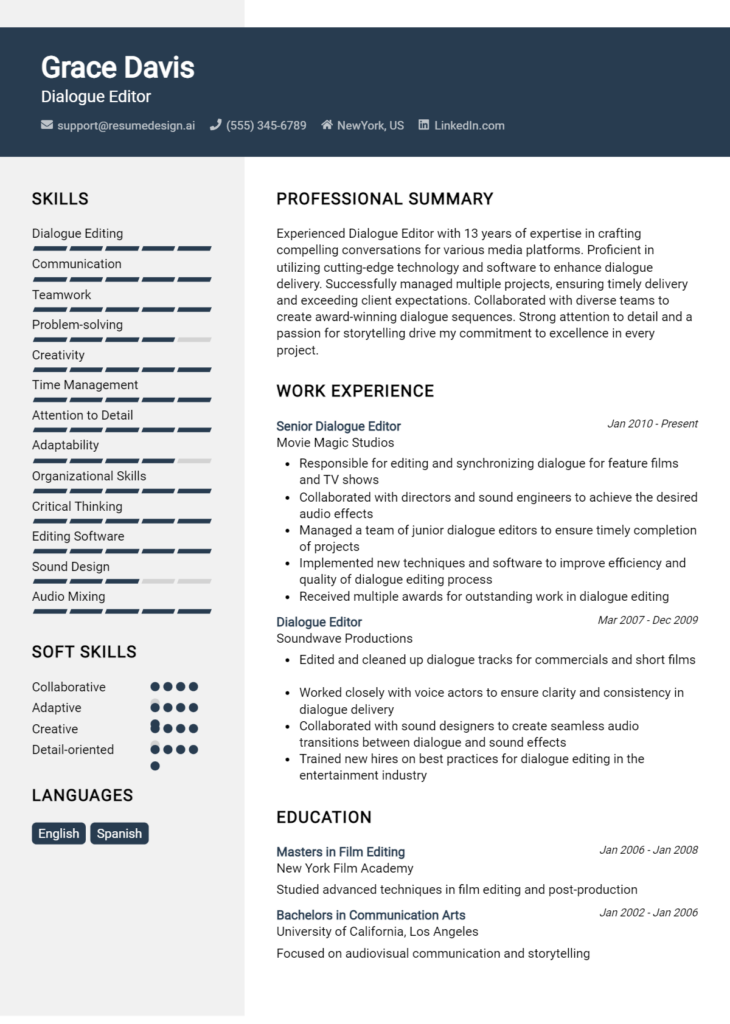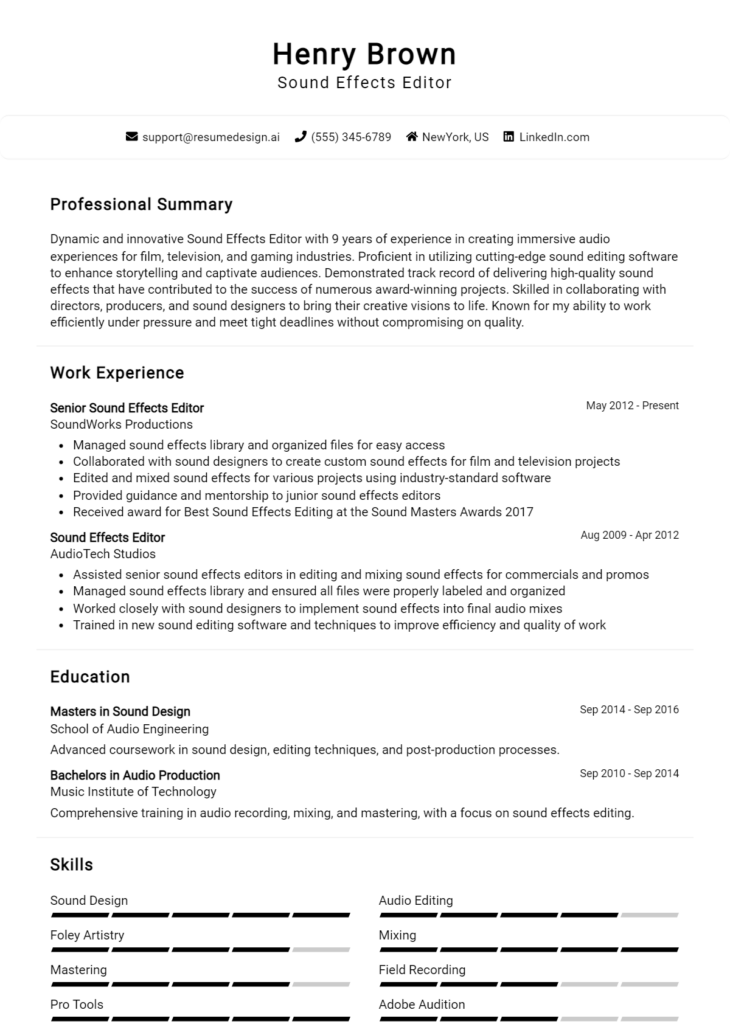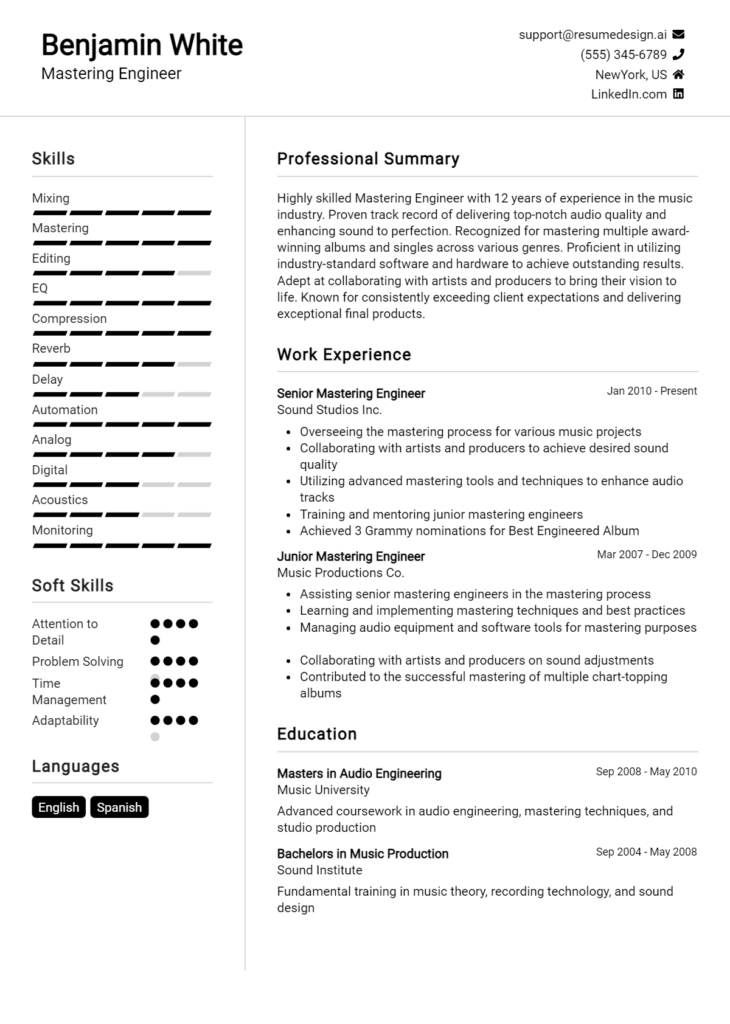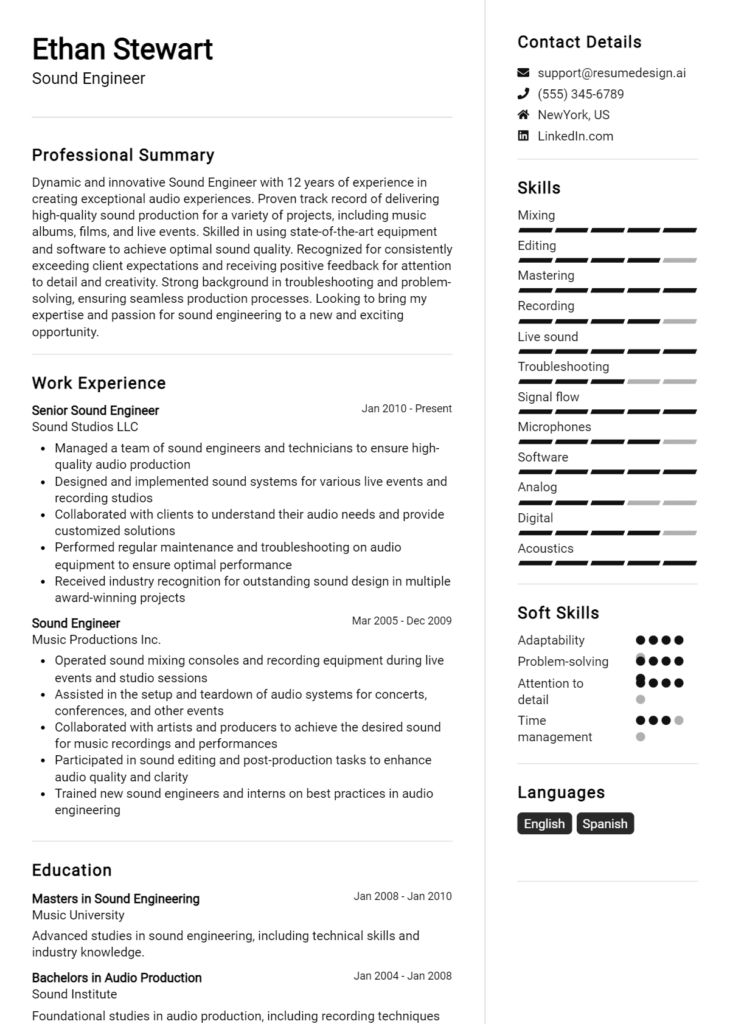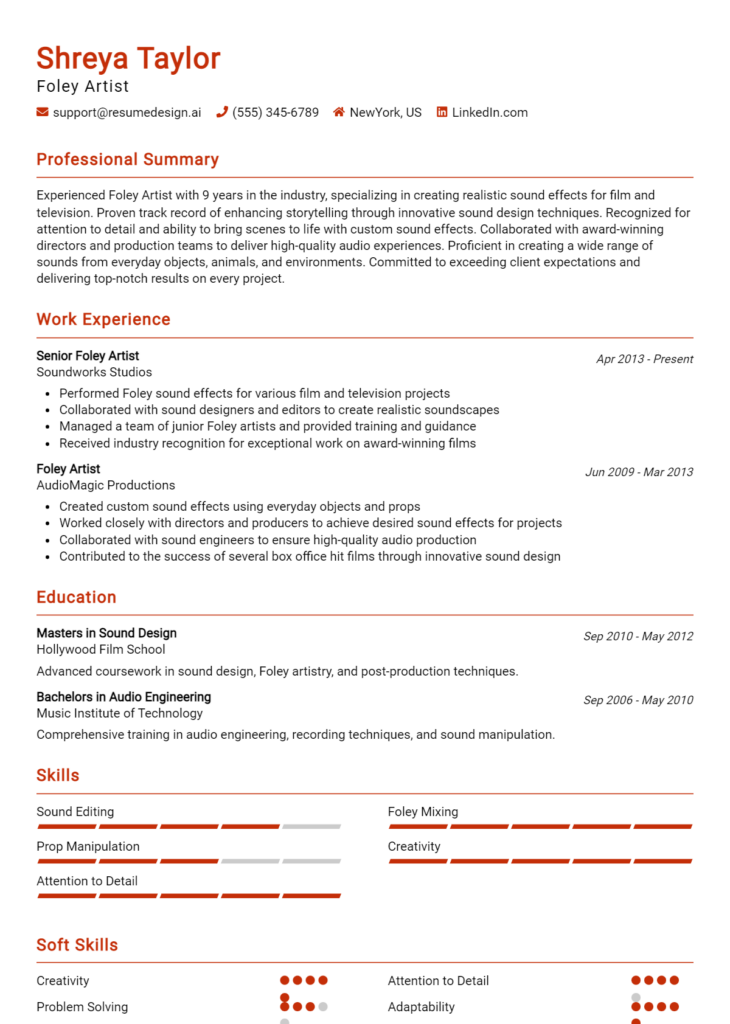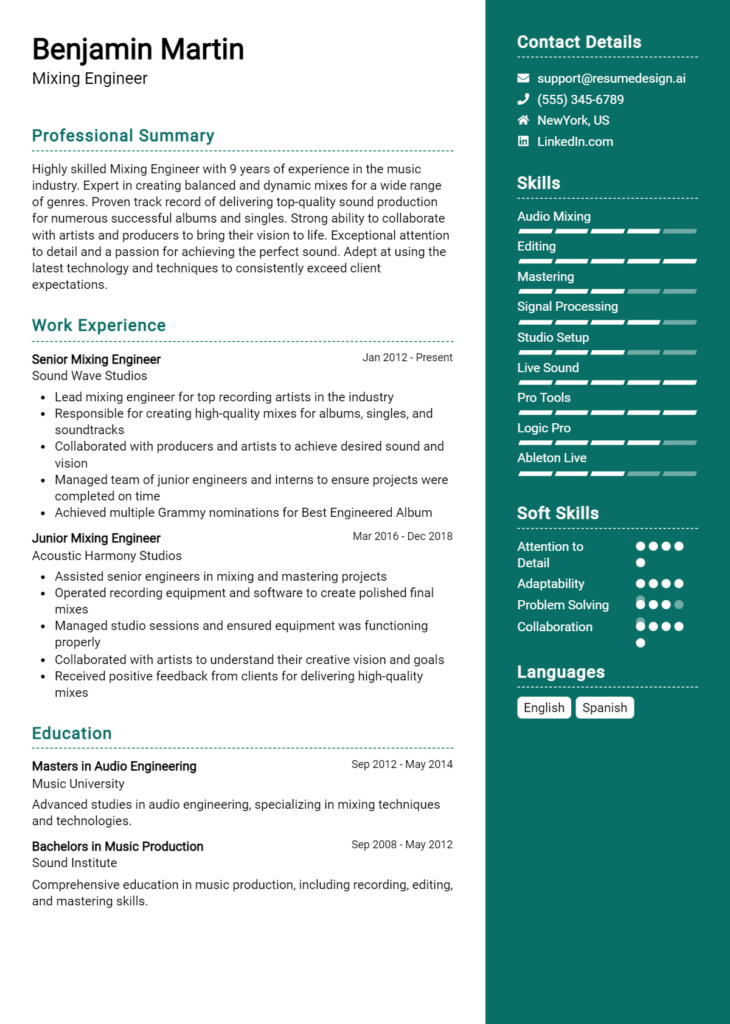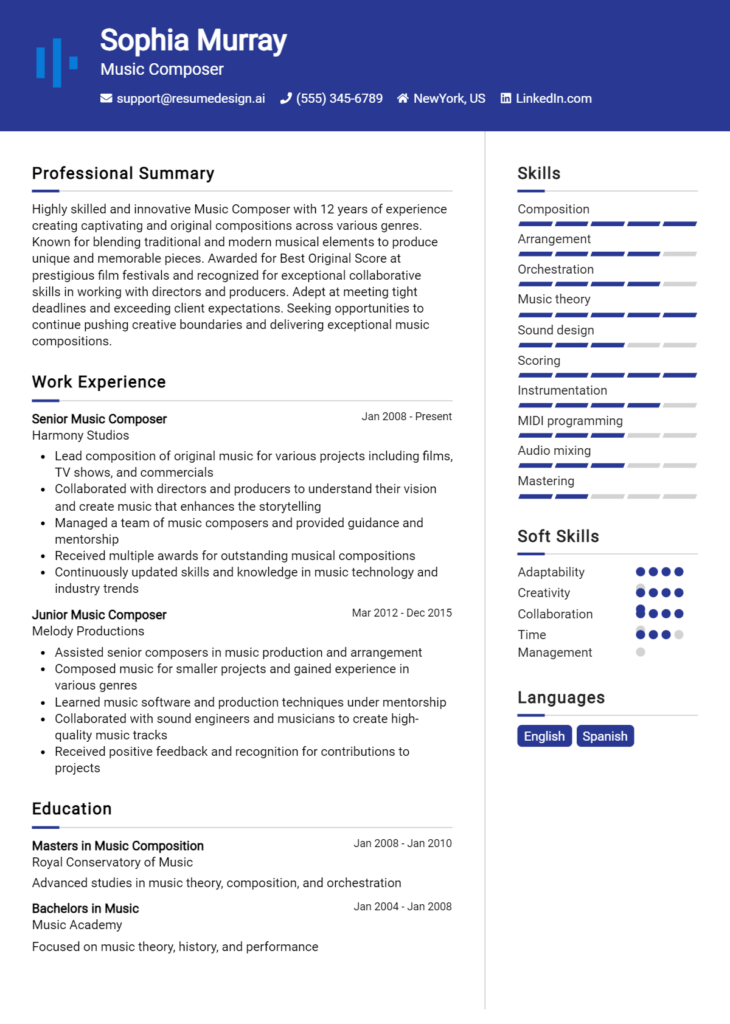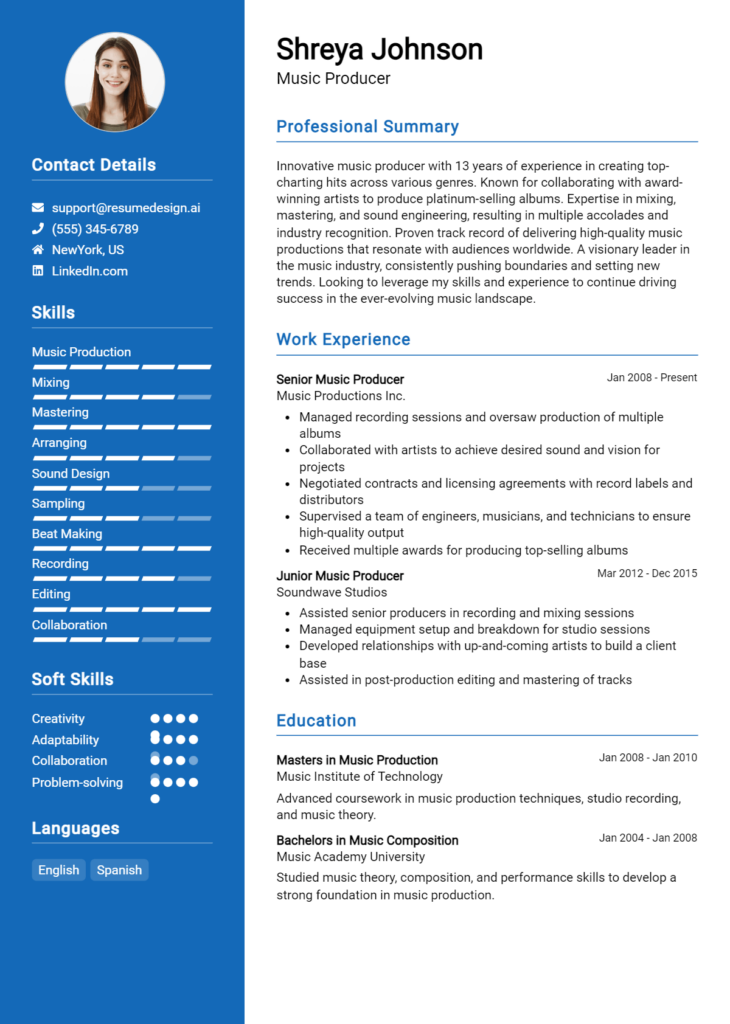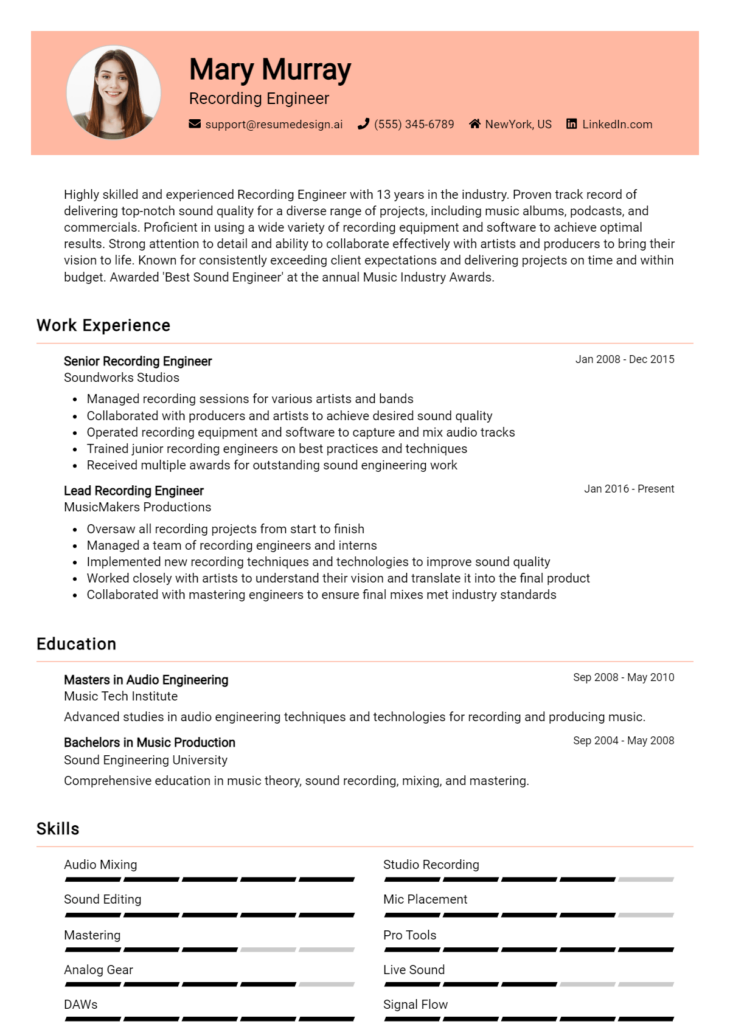Music Business Manager Core Responsibilities
A Music Business Manager plays a crucial role in the music industry, bridging the gap between artists, record labels, and marketing teams. Key responsibilities include managing contracts, overseeing budgets, and strategizing promotional efforts. Essential skills encompass technical proficiency in music software, operational management, and advanced problem-solving abilities. These competencies contribute significantly to the organization’s goals, ensuring artists thrive in a competitive landscape. A well-structured resume can effectively showcase these qualifications, highlighting the manager's value in driving success.
Common Responsibilities Listed on Music Business Manager Resume
- Developing and managing artist budgets and forecasts.
- Negotiating contracts and agreements with labels and agencies.
- Overseeing marketing strategies and promotional campaigns.
- Coordinating logistics for tours and live performances.
- Building and maintaining relationships with industry professionals.
- Analyzing sales data and market trends for strategic planning.
- Advising artists on career development and branding.
- Ensuring compliance with legal and regulatory requirements.
- Managing royalty collections and financial reporting.
- Conducting regular performance reviews and assessments.
- Collaborating with creative teams on project development.
- Staying updated on industry developments and innovations.
High-Level Resume Tips for Music Business Manager Professionals
In the competitive landscape of the music industry, a well-crafted resume is essential for Music Business Manager professionals looking to make a lasting impression on potential employers. Your resume is often the first glimpse hiring managers have of your qualifications, and it needs to effectively communicate not only your skills and experiences but also your achievements in the field. A resume that stands out can open doors to exciting opportunities in an industry where networking and reputation are key. This guide will provide practical and actionable resume tips specifically tailored for Music Business Manager professionals, helping you to present yourself as a compelling candidate.
Top Resume Tips for Music Business Manager Professionals
- Tailor your resume to each job description: Use keywords from the job listing to align your experience with the employer's needs.
- Showcase relevant experience: Highlight roles that directly relate to music management, including internships, volunteer work, and freelance projects.
- Quantify your achievements: Use numbers to demonstrate your impact, such as the percentage increase in revenue you achieved for an artist or the number of successful events you managed.
- Highlight industry-specific skills: Emphasize skills such as contract negotiation, marketing strategies, and artist development that are crucial in the music business.
- Include professional affiliations: Mention memberships in industry organizations, as they can add credibility to your profile.
- Use a clean, professional format: Ensure your resume is easy to read with clear headings, bullet points, and a logical flow of information.
- Incorporate a personal brand statement: Start with a brief summary that encapsulates your unique value proposition in the music industry.
- Keep it concise: Limit your resume to one or two pages, focusing on the most relevant information to keep the reader engaged.
- Proofread for errors: Ensure there are no grammatical or spelling mistakes, as attention to detail is critical in the music business.
By implementing these tips, you can significantly enhance your chances of landing a job in the Music Business Manager field. A targeted and polished resume not only showcases your qualifications but also demonstrates your professionalism and understanding of the industry, setting the stage for a successful career in music management.
Why Resume Headlines & Titles are Important for Music Business Manager
In the competitive landscape of the music industry, a Music Business Manager plays a pivotal role in navigating the complex dynamics between artists, labels, and various stakeholders. Crafting a compelling resume that stands out is essential, and one of the most critical components of this is the resume headline or title. A strong headline can immediately capture the attention of hiring managers by summarizing a candidate's key qualifications in a concise and impactful phrase. It serves as the first impression and should reflect the candidate's expertise, relevance to the position, and unique value proposition, ensuring it resonates with the specific job being applied for.
Best Practices for Crafting Resume Headlines for Music Business Manager
- Keep it concise and to the point.
- Use industry-relevant keywords that match the job description.
- Highlight your most significant accomplishments or skills.
- Tailor the headline for each application to ensure relevance.
- Avoid generic phrases; be specific about your role and expertise.
- Incorporate numbers or metrics to quantify achievements when possible.
- Make sure it reflects your professional identity and brand.
- Use action-oriented language to convey dynamism and enthusiasm.
Example Resume Headlines for Music Business Manager
Strong Resume Headlines
Dynamic Music Business Manager with 10+ Years of Experience in Artist Development and Revenue Growth
Results-Driven Music Industry Professional Specializing in Strategic Partnerships and Marketing for Emerging Artists
Innovative Music Business Manager with Proven Track Record of Increasing Revenue by 30% Through Effective Brand Collaborations
Experienced Music Business Executive Focused on Talent Management and Revenue Optimization
Weak Resume Headlines
Music Manager
Experienced Professional Seeking Opportunities
Manager in the Music Industry
The strong headlines are effective because they provide specific information about the candidate's experience, skills, and accomplishments, making them memorable and immediately relevant to hiring managers. In contrast, the weak headlines fail to impress due to their vagueness and lack of distinctiveness, which can leave hiring managers uncertain about the candidate's qualifications and fit for the role. A well-crafted headline can significantly enhance the chances of making a positive impression and securing an interview.
Writing an Exceptional Music Business Manager Resume Summary
Crafting an exceptional resume summary is crucial for a Music Business Manager as it serves as a powerful first impression for hiring managers. A strong summary succinctly encapsulates key skills, relevant experience, and notable accomplishments, providing a snapshot that draws attention and encourages further reading. It should be concise yet impactful, tailored specifically to the job in question, ensuring that the candidate stands out in a competitive industry where every detail counts.
Best Practices for Writing a Music Business Manager Resume Summary
- Quantify Achievements: Use numbers and metrics to demonstrate your impact, such as revenue growth or audience engagement.
- Focus on Relevant Skills: Highlight specific skills that are directly related to the music business, such as contract negotiation and marketing strategies.
- Tailor to the Job Description: Customize your summary for each application by incorporating keywords and phrases from the job listing.
- Be Concise: Aim for 3-5 sentences to keep your summary brief and to the point.
- Showcase Industry Knowledge: Mention your understanding of current trends and challenges within the music industry.
- Highlight Leadership Experience: If applicable, include any managerial roles or leadership experiences that showcase your ability to lead a team.
- Incorporate Soft Skills: Don't forget to mention interpersonal skills such as communication and relationship-building, which are vital in the music business.
Example Music Business Manager Resume Summaries
Strong Resume Summaries
Dynamic Music Business Manager with over 8 years of experience driving revenue growth by 35% through strategic marketing campaigns and artist management for multiple award-winning clients.
Results-oriented Music Business Manager skilled in contract negotiations and partnership development, successfully securing sponsorship deals worth over $500,000 for emerging artists.
Proven track record in overseeing music production and distribution, leading a team that increased digital sales by 50% within one year while launching successful promotional events.
Creative and analytical Music Business Manager with expertise in social media marketing, having grown artist engagement by 60% through targeted digital strategies and audience analytics.
Weak Resume Summaries
Dedicated music professional with experience in the industry looking for a new opportunity.
Music Business Manager with some experience in marketing and artist relations, seeking to further my career.
The examples provided illustrate the stark contrast between strong and weak resume summaries. Strong summaries are specific, quantify achievements, and highlight relevant skills that directly align with the role, making them impactful and memorable. Conversely, weak summaries lack detail and specificity, failing to convey the candidate's unique value or contributions, ultimately making them less compelling to hiring managers.
Work Experience Section for Music Business Manager Resume
The work experience section of a Music Business Manager resume is crucial as it serves as a comprehensive showcase of the candidate's technical skills, leadership capabilities, and overall effectiveness in delivering high-quality products within the music industry. This section allows potential employers to gauge how well the candidate can manage teams, navigate complex industry standards, and achieve measurable success. By quantifying achievements and aligning work experience with industry benchmarks, candidates can significantly enhance their appeal and demonstrate their value in a competitive job market.
Best Practices for Music Business Manager Work Experience
- Highlight specific technical skills relevant to the music industry, such as knowledge of digital distribution platforms and music licensing.
- Use quantifiable results to demonstrate the impact of your work, such as percentage increases in revenue or audience engagement.
- Emphasize collaboration by detailing your experience in managing cross-functional teams or working with artists and producers.
- Tailor your experience to align with industry standards and the specific needs of potential employers.
- Incorporate industry-specific terminology to convey expertise and familiarity with the music business landscape.
- Showcase problem-solving skills by describing challenges faced and the solutions implemented to overcome them.
- Include relevant certifications or training that enhance your qualifications in music business management.
- Provide context for your achievements, explaining the significance of your contributions to past employers or projects.
Example Work Experiences for Music Business Manager
Strong Experiences
- Increased annual revenue by 30% through strategic partnerships and the implementation of a new digital marketing campaign for a major artist.
- Successfully managed a team of 10 professionals to launch a multi-platform album release, resulting in a 50% increase in streaming numbers within the first month.
- Negotiated licensing deals that generated over $200,000 in income for independent artists, enhancing their visibility and market reach.
- Implemented data-driven strategies that improved audience engagement by 40%, utilizing analytics to guide promotional efforts.
Weak Experiences
- Assisted in various projects related to music management.
- Worked with artists on promotional activities.
- Contributed to team efforts that were somewhat successful.
- Helped organize events and manage schedules for artists.
The examples provided illustrate a clear distinction between strong and weak experiences. Strong experiences are characterized by specific, quantifiable outcomes that demonstrate the candidate's technical proficiency and leadership skills in achieving significant results. In contrast, weak experiences lack detail, specificity, and measurable achievements, failing to convey the candidate's true potential and impact in the music business landscape.
Education and Certifications Section for Music Business Manager Resume
The education and certifications section of a Music Business Manager resume plays a crucial role in establishing the candidate's qualifications and expertise in the field. This section not only highlights the academic background of the candidate but also showcases industry-relevant certifications and continuous learning efforts that are vital in the ever-evolving music industry. By providing details about relevant coursework, specialized training, and recognized credentials, candidates can greatly enhance their credibility and demonstrate their alignment with the requirements of the job role, thereby increasing their chances of standing out to potential employers.
Best Practices for Music Business Manager Education and Certifications
- Prioritize relevant degrees such as Music Business, Arts Management, or Music Industry Studies.
- Include industry-recognized certifications from reputable organizations to demonstrate specialized knowledge.
- Highlight any coursework that aligns with the job responsibilities, such as marketing, finance, or copyright law.
- List ongoing professional development courses or workshops to show commitment to continuous learning.
- Keep the information concise and focused on achievements that relate directly to music business management.
- Use clear formatting to ensure readability and make it easy for hiring managers to identify key qualifications.
- Consider including relevant internships or practical experiences that complement formal education.
- Regularly update this section to reflect any new qualifications or educational pursuits.
Example Education and Certifications for Music Business Manager
Strong Examples
- Bachelor of Arts in Music Business, University of California, Los Angeles
- Certification in Music Industry Essentials, Berklee College of Music
- Coursework in Music Marketing and Promotion, New York University
- Advanced Certificate in Copyright and Intellectual Property Law, University of Southern California
Weak Examples
- Bachelor of Arts in Philosophy, University of Texas
- Certification in Basic Computer Skills
- Coursework in General Education, Community College
- High School Diploma, Graduated 2005
The strong examples are considered relevant and impactful as they directly align with the skills and knowledge necessary for a Music Business Manager role, showcasing specialized education and certifications that demonstrate an understanding of the music industry. Conversely, the weak examples lack relevance to the music business and fail to demonstrate any specialized knowledge or industry-related skills, thereby weakening the candidate's position in the application process.
Top Skills & Keywords for Music Business Manager Resume
As a Music Business Manager, possessing the right skills is crucial for navigating the complex landscape of the music industry. A well-crafted resume that highlights both hard and soft skills can significantly enhance your appeal to potential employers. Skills not only demonstrate your capability to handle the demands of the role but also showcase your versatility in managing various aspects of an artist's career, from negotiations to marketing strategies. Ensuring that your resume is enriched with relevant skills will not only improve your chances of landing an interview but also set you apart from the competition in this dynamic field.
Top Hard & Soft Skills for Music Business Manager
Soft Skills
- Communication
- Negotiation
- Leadership
- Problem-solving
- Networking
- Time management
- Adaptability
- Creativity
- Interpersonal skills
- Conflict resolution
- Team collaboration
- Critical thinking
- Emotional intelligence
- Strategic thinking
- Decision making
Hard Skills
- Contract management
- Financial analysis
- Marketing strategy
- Data analysis
- Social media management
- Project management
- Event planning
- Licensing and rights management
- Budgeting
- Knowledge of music publishing
- Digital distribution
- Brand development
- Public relations
- Market research
- Music production techniques
- Familiarity with industry software (e.g., Pro Tools, Logic Pro)
- Understanding of copyright law
- Sales and revenue generation
By focusing on these essential skills, you can create a compelling resume that effectively showcases your qualifications, making you a strong candidate for a Music Business Manager position. Additionally, emphasizing relevant work experience can further strengthen your application, demonstrating not just theoretical knowledge but practical application of these skills in real-world scenarios.
Stand Out with a Winning Music Business Manager Cover Letter
As a dedicated and passionate professional in the music industry, I am excited to apply for the Music Business Manager position at [Company Name]. With a strong background in artist management, marketing strategies, and contract negotiations, I am confident in my ability to contribute to the success of your organization and the artists you represent. My experience working with diverse musical talents has equipped me with the skills to navigate the complexities of the music business while fostering strong relationships with clients, venues, and industry stakeholders.
Throughout my career, I have successfully managed several emerging artists, helping them to establish their brand and grow their fan base. By implementing targeted marketing campaigns and leveraging social media platforms, I have increased visibility and engagement, resulting in sold-out shows and enhanced streaming numbers. Additionally, my expertise in financial management ensures that my clients are not only creatively fulfilled but also financially secure, allowing them to focus on their artistry without the burden of financial uncertainty.
I pride myself on my ability to communicate effectively across all levels of the music industry. My strong negotiation skills have led to lucrative contracts and partnerships that benefit both the artists I manage and the companies they collaborate with. I am adept at identifying opportunities for growth and collaboration, ensuring that my clients have a competitive edge in an ever-evolving market. I am particularly drawn to [Company Name] because of its commitment to artist development and innovation, and I believe that my proactive approach and strategic mindset align perfectly with your mission.
I am eager to bring my passion for music and my extensive experience in the business side of the industry to [Company Name]. I look forward to the opportunity to discuss how I can contribute to the continued success of your team and the artists you represent. Thank you for considering my application; I hope to connect soon to explore this exciting possibility further.
Common Mistakes to Avoid in a Music Business Manager Resume
When crafting a resume for a Music Business Manager position, it's crucial to present your skills and experiences in a way that resonates with hiring managers and showcases your unique qualifications. However, many applicants make common mistakes that can undermine their chances of landing an interview. Avoiding these pitfalls will not only strengthen your resume but also highlight your professionalism and understanding of the music industry.
Generic Objective Statement: Using a vague or generic objective can make you seem unfocused. Tailor your statement to reflect your specific career goals and how they align with the position.
Overloading with Jargon: While industry-specific terminology can demonstrate knowledge, using too much jargon can alienate readers. Aim for a balance that showcases your expertise without overwhelming them.
Neglecting Quantifiable Achievements: Failing to include measurable successes can make your accomplishments seem insignificant. Use numbers to highlight your impact, such as percentage increases in revenue or the number of successful projects managed.
Ignoring Tailored Skills: Listing skills that are not relevant to the position can dilute your resume. Focus on the skills that directly relate to the Music Business Manager role, such as contract negotiation, marketing strategies, and financial management.
Inconsistent Formatting: A disorganized or inconsistent format can distract from your content. Maintain uniformity in font, bullet points, and spacing to create a professional appearance.
Lack of Industry Experience: Omitting relevant experience can be detrimental. Even if your previous roles weren't directly in music management, highlight transferable skills and experiences that showcase your capabilities.
Typos and Grammatical Errors: Simple mistakes can undermine your credibility. Take the time to proofread your resume thoroughly or have someone else review it to catch any errors.
Failing to Include Relevant Education or Certifications: Not mentioning your educational background or certifications can leave out important qualifications. Ensure you include any degrees, courses, or training pertinent to the music business.
Conclusion
As a Music Business Manager, you play a vital role in the success of artists and their careers. Your responsibilities include negotiating contracts, managing finances, and providing strategic advice. This multifaceted position requires a blend of business acumen, industry knowledge, and interpersonal skills.
Throughout this article, we've explored the essential skills and experiences that are crucial for thriving in this role, such as understanding music rights, marketing strategies, and effective communication. We also discussed how staying updated with industry trends can significantly enhance your effectiveness as a manager.
To ensure you stand out in a competitive field, it's important to present a polished and professional resume that highlights your unique qualifications and experiences. Take the time to review and refine your Music Business Manager resume, ensuring it reflects your expertise and achievements accurately.
To assist you in this process, there are several valuable resources available. Check out resume templates for inspiration, utilize a resume builder to create a visually appealing document, and explore resume examples that can guide you in showcasing your skills effectively. Additionally, don’t forget to enhance your application with compelling cover letter templates that can help you make a strong first impression.
Now is the time to take action! Review your resume and leverage these tools to ensure you present yourself as the best candidate for any opportunity in the music business.

